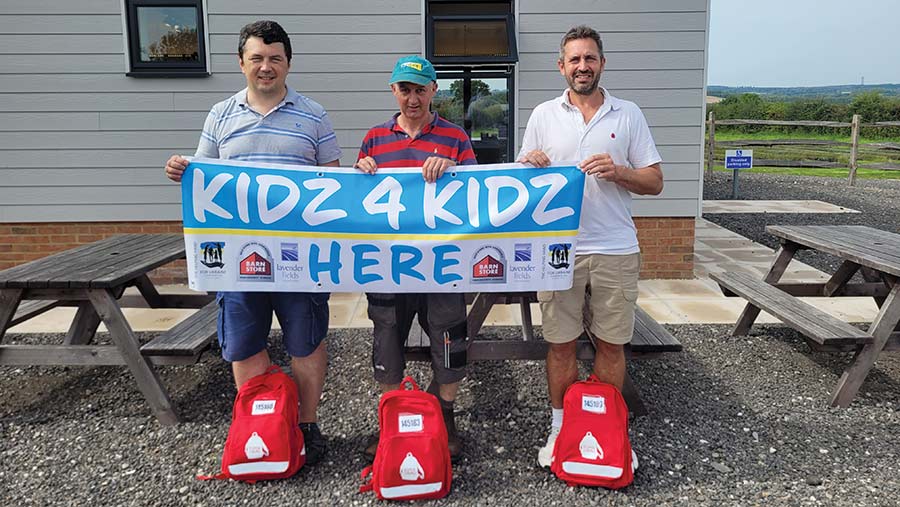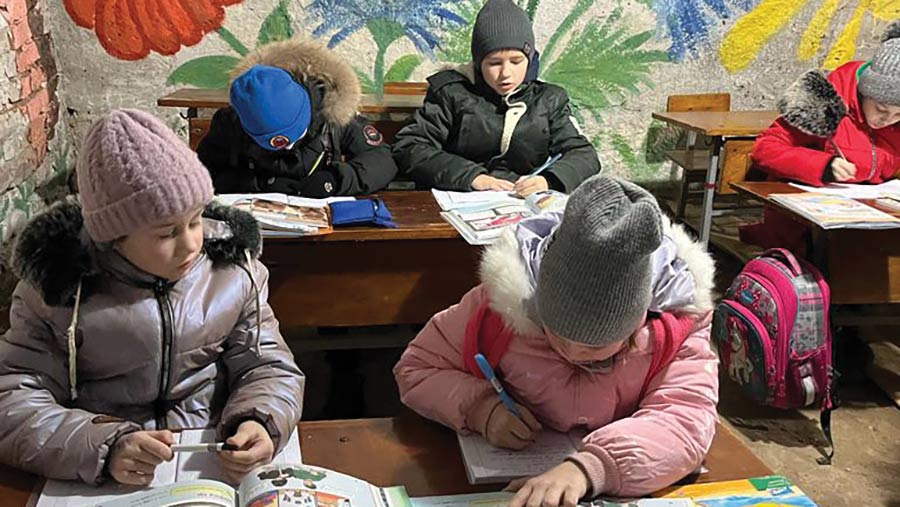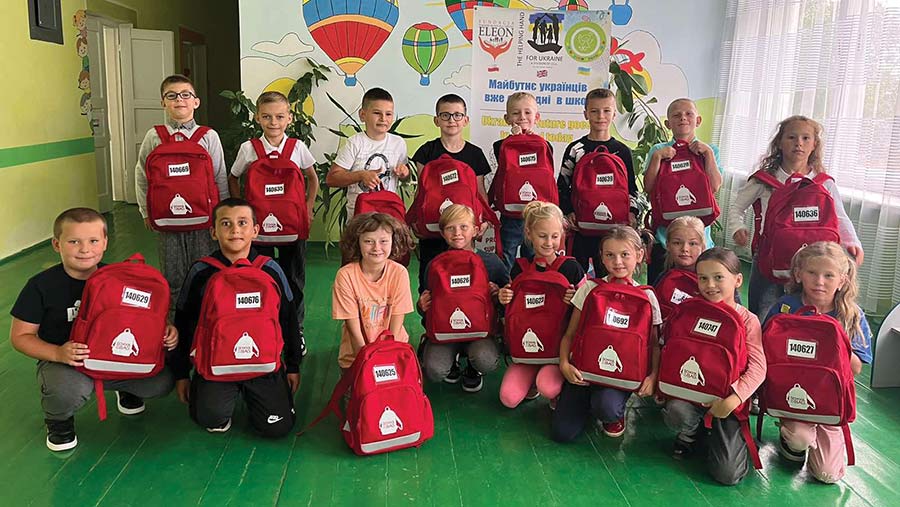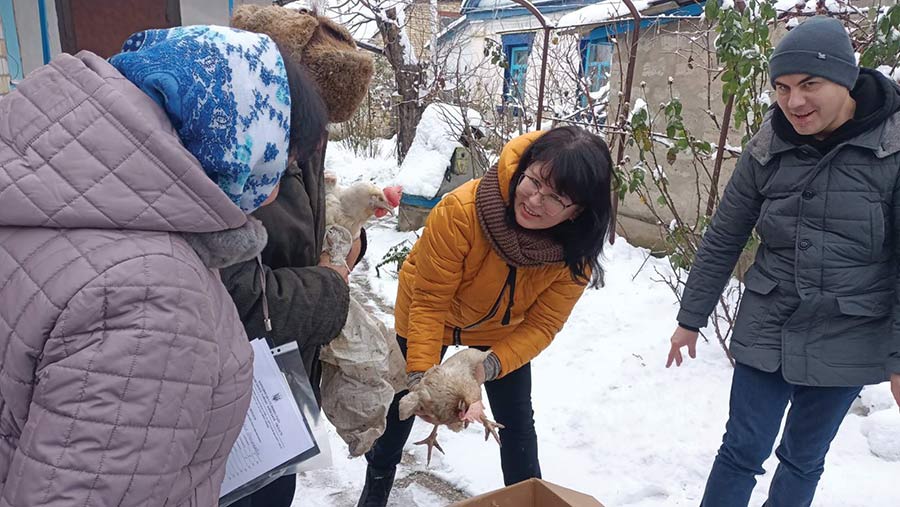Meet the farmers trying to save schools in Ukraine
 (From L to R) Dennis Vystavkin, Simon Butler and Luke Simon © CCL
(From L to R) Dennis Vystavkin, Simon Butler and Luke Simon © CCL Farming brothers Simon and Nick Butler, from Selborne in Hampshire, have launched an appeal to get vital resources to schoolchildren in rural parts of war-torn Ukraine.
Teaming up with the Chernobyl Children’s Lifeline (CCLL) charity, also known as “The Helping Hand for Ukraine”, Simon explains that his involvement with CCLL began when the charity started renting one of the units on their farm.
He soon decided that he wanted to be involved, and raise funds and resources in any way he could.
See also: Pick-ups for Peace donates 100 vehicles to Ukrainian military
“It really struck a chord with me to see how much they achieve with so few resources,” he says.
“The charity has been operating in Ukraine for quite some time, originally helping families that had been affected by the Chernobyl nuclear disaster. But now, they are helping many rural families affected by the war.”
Charity chief executive Dennis Vystavkin is based on the Butlers’ farm, where he oversees all of the charity’s projects in Ukraine.
“It is the rural farming communities that have suffered badly throughout history in Ukraine,” Dennis explains.
“Even before the war and Covid, we’ve been supporting predominantly farming-based communities in the North, particularly in the aftermath of Chernobyl.
“The crops and produce became contaminated. There are farmers that can’t sell their produce because of radioactive contamination.”
Unfortunately, many of the areas that were impacted by the nuclear disaster have now been devastated by the war, undoing years of rebuilding efforts and support from charities such as CCLL.
“For these families, not only have they suffered due to the contamination, but they have been directly hit during the first stage of the Russian attack.
“Unarguably, this war has caused another layer of contamination” says Dennis.
Farming
There are still lots of unexploded shells and land mines hidden in the fields and woodlands, which makes it very difficult for farmers and forestry workers to go about their daily work safely.
The ongoing conflict has also meant that many agricultural vehicles have been seized by the armed forces for use by the Ukrainian army, many of which have been destroyed by Russian attacks.
“All of these elements make it difficult for the farmers to find enough machinery to sustain a basic level of agricultural produce,” explains Dennis.
Education

© CCLL
A new challenge facing these rural communities, beyond the contamination and continued disruption from the war, is the impact on education and schooling.
Many rural areas have lost their local schools to aerial attacks, with those remaining struggling to provide lessons from bomb shelters and under constant threat of attack.
“These areas have been wiped and looted,” says Dennis, adding that young people are in desperate need of provisions to continue their schooling.
This is how the “Kidz 4 Kidz” initiative was conceived.
With help from UK charity School in a Bag, the team has created a system to get school bags full of equipment out to Ukraine.
“These are not just simple school bags – they are built with around £80 worth of goods in each one,” says Dennis.
The school bags contain stationery and studying resources, as well as vital care and survival kits, including lunch bags, water bottles, soap, towels and rechargeable torches.
“For children in these communities in Ukraine, it is a normal occurrence to come under missile attacks up to four times a day.
“The whole school has to make it into a bomb shelter in under eight minutes, and they take these bags as their emergency packs,” Dennis says.
“It contains their little world – and their exercise books – because schooling must continue.”
The result of the pandemic, and now the war, means that Ukrainian schoolchildren have missed more than 10 academic terms, over four years, out of their curriculum.
“Think about what would happen to any community, anywhere in the world, where their children haven’t had proper schooling for four years.
“Ukraine needs future doctors, farmers, engineers – the lessons must keep going”.
Fundraising

© CCLL
Last year, the team managed to distribute 1,800 school bags across Ukraine, and they are determined to exceed that number this year.
“I have written to nearly every school in East Hampshire [approximately 58] to ask them to raise money and interest among the school kids, and that’s why the project is called Kidz 4 Kidz,” says Simon. “We have been trying to get local children to think about other schoolchildren in Ukraine.
“They open their schoolbag, and it has all of their world within it. To the parents and the wider communities, these bags provide hope that people care on the outside.”
To make a donation towards CCLL’s work in Ukraine, visit their Just Giving page. Alternatively, if you have a generator or good working equipment to donate, contact the charity via their website ccll.org.uk.
Food and farming resources
CCLL also runs a livestock programme to help evacuees that have been moved to the countryside.
They supply egg-laying hens and broiler chickens, with starter packs of feed, piglets, in-calf cows, geese, and ducks to affected families.

© CCLL
They also provide vegetable seeds and financial resources to help them buy diesel to operate cars and machinery.
Dennis explains that it is essential to give these rural families a degree of self-sufficiency: “We are trying not to give them the fish, but instead to provide the fishing rod.
“We are having to supply these rural communities with everything, starting from scratch,” he explains.
“Farming and self-sufficiency is very important at this time, and it is always on our mind.
“We want to give all of the tools so that when we move to help the next people in need, they can rely on the resources that we have provided.”
Farmers helping Ukraine
Read more about how farmers are donating their 4x4s to Ukraine through the Pick-ups for Peace initiative.
